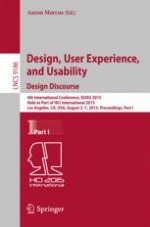2015 | OriginalPaper | Chapter
Usability Heuristics for Heuristic Evaluation of Gestural Interaction in HCI
Authors : Ngip Khean Chuan, Ashok Sivaji, Wan Fatimah Wan Ahmad
Published in: Design, User Experience, and Usability: Design Discourse
Publisher: Springer International Publishing
Activate our intelligent search to find suitable subject content or patents.
Select sections of text to find matching patents with Artificial Intelligence. powered by
Select sections of text to find additional relevant content using AI-assisted search. powered by
